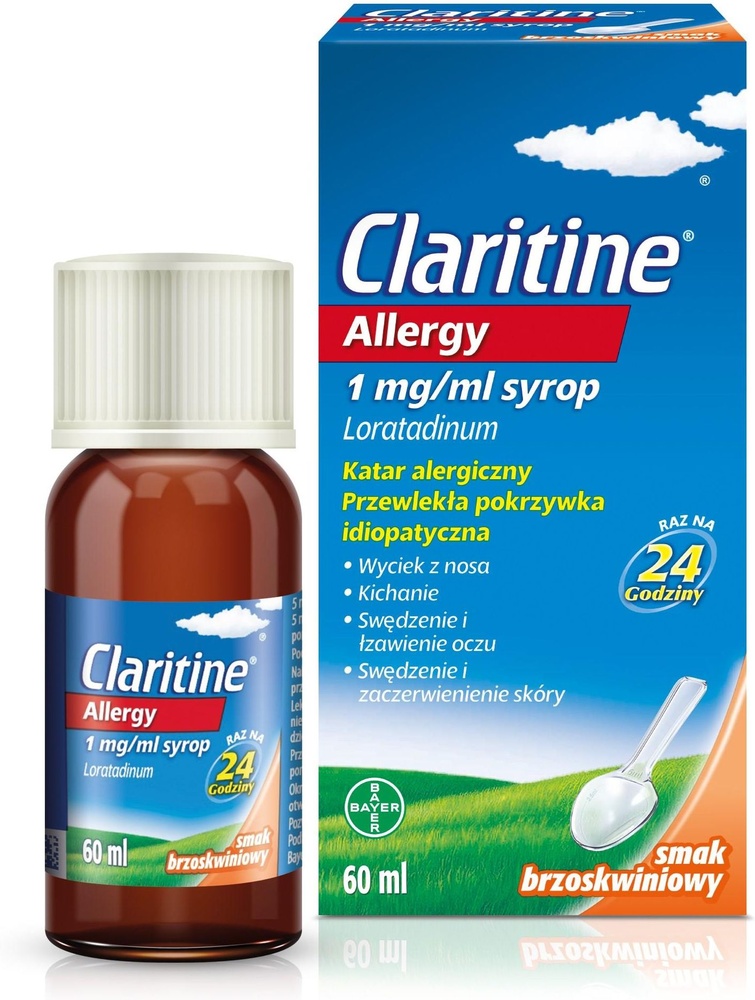

Claritine Allergi

Ask a doctor about a prescription for Claritine Allergi

How to use Claritine Allergi
Leaflet attached to the packaging: patient information
CLARITINE ALLERGY, 1 mg/ml, syrup
Loratadine
Read the leaflet carefully before taking the medicine, as it contains
important information for the patient.
This medicine should always be taken exactly as described in the patient leaflet or as advised by the doctor or pharmacist.
- This leaflet should be kept in case it needs to be read again.
- If advice or additional information is needed, the pharmacist should be consulted.
- If the patient experiences any side effects, including any possible side effects not listed in the leaflet, the doctor or pharmacist should be informed. See section 4.
- If there is no improvement after 3 days or the patient feels worse, the doctor should be contacted.
Table of contents of the leaflet
- 1. What is Claritine Allergy and what is it used for
- 2. Important information before taking Claritine Allergy
- 3. How to take Claritine Allergy
- 4. Possible side effects
- 5. How to store Claritine Allergy
- 6. Contents of the pack and other information
1. What is Claritine Allergy and what is it used for
Claritine Allergy belongs to a group of antihistamine medicines. These medicines reduce allergy symptoms by preventing the actions of a substance called histamine, which is produced in the body.
Claritine Allergy relieves symptoms associated with allergic rhinitis, such as:
sneezing, itching and runny nose, itching and burning eyes.
The medicine may also be used to relieve symptoms of chronic idiopathic urticaria (itching, skin redness).
The therapeutic effect of relieving these symptoms lasts throughout the day, making it easier to return to normal daily activities and normal sleep.
If there is no improvement after 3 days or the patient feels worse, the doctor should be consulted.
Claritine Allergy should only be used in patients with a doctor-diagnosed allergic rhinitis and chronic idiopathic urticaria, and according to the doctor's instructions.
2. Important information before taking Claritine Allergy
When not to take Claritine Allergy:
- if the patient is allergic to loratadine or any of the other ingredients of this medicine (listed in section 6).
Warnings and precautions
Before starting to take Claritine Allergy, the doctor or pharmacist should be consulted:
- if the patient has liver function disorders (see section 3. How to take Claritine Allergy).
Skin tests
The use of Claritine Allergy should be stopped about 48 hours before scheduled skin tests, as antihistamines may cause false negative results of these tests (may reduce or completely inhibit the skin reaction that would normally be positive).
Claritine Allergy and other medicines
Side effects may be exacerbated when taking Claritine Allergy with medicines that affect the activity of certain enzymes responsible for drug metabolism in the liver.
However, clinical trials have not shown an increase in side effects when taking loratadine with medicines that affect the activity of these enzymes.
Concomitant administration of loratadine with ketoconazole, erythromycin, or cimetidine results in increased loratadine plasma levels, but without clinical consequences. Concomitant use of loratadine with medicines that affect liver metabolism should be done under medical supervision.
The doctor or pharmacist should be informed about all medicines taken by the patient currently or recently, as well as about medicines that the patient plans to take. This also applies to over-the-counter medicines.
Taking Claritine Allergy with food, drink, and alcohol
The medicine can be taken independently of meals.
Taking the medicine with alcohol does not enhance its effects to a degree that can be assessed by psychomotor tests.
Pregnancy, breastfeeding, and fertility
If the patient is pregnant or breastfeeding, thinks she may be pregnant, or plans to have a child, she should consult the doctor or pharmacist before taking this medicine.
As a precaution, it is recommended to avoid taking Claritine Allergy during pregnancy.
Loratadine passes into breast milk, so it is not recommended to take the medicine during breastfeeding.
There are no data on fertility in men and women.
Driving and using machines
Clinical trials have shown that loratadine does not affect or has a negligible effect on the ability to drive and use machines. In some people, very rare cases of drowsiness have occurred, which may affect the ability to drive and use machines.
Claritine Allergy contains liquid maltitol, liquid sorbitol, propylene glycol, sodium benzoate
The medicine contains 2.5 mg of sodium benzoate in 5 ml of syrup, which corresponds to 0.5 mg/ml.
The medicine contains 250 mg of propylene glycol in 5 ml of syrup, which corresponds to 50 mg/ml.
The medicine contains less than 1 mmol (23 mg) of sodium in 5 ml of syrup, which means the medicine is considered "sodium-free".
The medicine contains 1 g of sorbitol in 5 ml of syrup, which corresponds to 200 mg/ml.
Sorbitol is a source of fructose. If the patient (or their child) has previously been diagnosed with intolerance to some sugars or has been diagnosed with hereditary fructose intolerance, a rare genetic disease in which the patient's body does not break down fructose, the patient should consult the doctor before taking the medicine or giving it to the child.
3. How to take Claritine Allergy
This medicine should always be taken exactly as described in the patient leaflet or as advised by the doctor or pharmacist. If in doubt, the doctor or pharmacist should be consulted.
Recommended dose
Adults and children over 12 years:
10 ml of syrup once a day. The medicine can be taken independently of meals. It is not necessary to drink water or other fluids after taking the syrup.
Children from 6 to 12 years - dosage depends on body weight:
Body weight over 30 kg:
10 ml of syrup once a day. The medicine can be taken independently of meals. It is not necessary to drink water or other fluids after taking the syrup.
Body weight 30 kg or less:
It is not recommended to take Claritine Allergy.
Patient with severe liver function disorders:
Adults and children with a body weight over 30 kg:10 ml of syrup every other day.
There is no need to change the dose in elderly patients and patients with renal impairment.
If the effect of Claritine Allergy is too strong or too weak, the doctor should be consulted.
Taking a higher dose of Claritine Allergy than recommended
In case of taking a higher dose of Claritine Allergy than recommended, the doctor or pharmacist should be consulted immediately.
After an overdose of Claritine Allergy, the following have been observed: drowsiness, increased heart rate, and headache.
In case of an overdose, symptomatic and supportive treatment should be applied immediately and continued as long as necessary. Activated charcoal can be given as a water suspension. The doctor may also perform gastric lavage. Loratadine cannot be removed from the body by hemodialysis; it is not known whether it can be removed by peritoneal dialysis.
There are no data indicating that loratadine causes abuse or dependence.
Missing a dose of Claritine Allergy
If the patient forgets to take the medicine at the usual time, they should take it as soon as possible and then return to the usual dosing schedule. A double dose should not be taken to make up for the missed dose.
In case of any further doubts about taking this medicine, the doctor or pharmacist should be consulted.
4. Possible side effects
Like all medicines, this medicine can cause side effects, although not everybody gets them.
Common side effectsassociated with taking Claritine Allergy (in 1 to 10 out of 100 patients taking the medicine) are:
- in children from 2 to 12 years - headache, nervousness, and fatigue.
- in adults and adolescents - drowsiness.
Uncommon side effectsassociated with taking Claritine Allergy (in 1 to 10 out of 1000 patients taking the medicine) in adults and adolescents are:
- headache, increased appetite, and sleep disorders, fatigue, dry mouth, gastrointestinal disorders such as nausea, stomach inflammation, and allergic symptoms such as rash.
Rare side effects(less than 1 in 10,000 patients taking the medicine), observed after the medicine was introduced to the market, are:
- severe allergic reactions (including difficulty breathing, wheezing, itching, hives, swelling). If severe allergic reactions occur, the medicine should be stopped and the doctor should be consulted immediately.
- dizziness, seizures, irregular or rapid heartbeat, liver function disorders, hair loss.
Side effect of unknown frequency(frequency cannot be estimated from available data): weight gain.
Reporting side effects
If any side effects occur, including any side effects not listed in the leaflet, the doctor or pharmacist should be informed. Side effects can be reported directly to the Department of Monitoring of Adverse Reactions to Medicinal Products of the Office for Registration of Medicinal Products, Medical Devices, and Biocidal Products:
Aleje Jerozolimskie 181C, 02-222 Warsaw, Tel.: +48 22 49 21 301, Fax: +48 22 49 21 309, e-mail:
[email protected].
Side effects can also be reported to the marketing authorization holder.
Reporting side effects will help to gather more information on the safety of the medicine.
5. How to store Claritine Allergy
The medicine should be stored out of sight and reach of children.
Store in a temperature below 25°C.
Shelf life after first opening the bottle: 1 month.
Do not use this medicine after the expiry date stated on the packaging after: EXP. The expiry date refers to the last day of the specified month.
Medicines should not be disposed of via wastewater or household waste containers. The pharmacist should be asked how to dispose of medicines that are no longer needed. This will help protect the environment.
6. Contents of the pack and other information
What Claritine Allergy contains
- The active substance of the medicine is loratadine. 1 ml of syrup contains 1 mg of loratadine. 5 ml of syrup contains 5 mg of loratadine. 10 ml of syrup contains 10 mg of loratadine.
- Other ingredients (excipients) are: propylene glycol, glycerol, sodium benzoate, sucralose, liquid maltitol, liquid sorbitol, grape flavor 936.1368U, sodium dihydrogen phosphate dihydrate, phosphoric acid, disodium edetate, purified water.
What Claritine Allergy looks like and what the pack contains
The medicine is in a plastic bottle made of polyethylene terephthalate (PET) with a polypropylene (PP) cap with a child-resistant closure, placed in a cardboard box. The bottle contains 60 ml of syrup. The syrup is clear, colorless to light yellow. A measuring cup with 5 ml and 10 ml markings is attached to the bottle.
Marketing authorization holder and manufacturer
Marketing authorization holder:
Bayer Sp. z o.o.
Aleje Jerozolimskie 158
02-326 Warsaw
Tel.: +48 22 572 35 00
Importer:
BerliMed S.A.
Poligono Industrial Santa Rosa
Calle Francisco Alonso No.7
28806 Alcalá de Henares (Madrid)
Spain
Date of last revision of the leaflet:
- Country of registration
- Active substance
- Prescription requiredNo
- ImporterBerlimed S.A.
- This information is for reference only and does not constitute medical advice. Always consult a licensed doctor before taking any medication. Oladoctor is not responsible for medical decisions based on this content.
- Alternatives to Claritine AllergiDosage form: Tablets, 10 mgActive substance: loratadineManufacturer: US Pharmacia Sp. z o.o.Prescription requiredDosage form: Tablets, 5 mg + 120 mgActive substance: loratadineManufacturer: SAG MANUFACTURING, S.L.U.Prescription not requiredDosage form: Tablets, 10 mgActive substance: loratadineManufacturer: Bayer Bitterfeld GmbHPrescription not required
Alternatives to Claritine Allergi in other countries
The best alternatives with the same active ingredient and therapeutic effect.
Alternative to Claritine Allergi in Spain
Alternative to Claritine Allergi in Ukraine
Online doctors for Claritine Allergi
Discuss dosage, side effects, interactions, contraindications, and prescription renewal for Claritine Allergi – subject to medical assessment and local rules.















